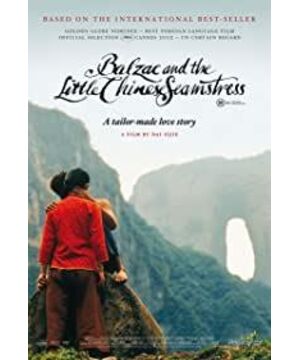Another story about educated youths going to the countryside. In fact, I have always been worried about seeing works on this subject, because it seems that in the later film and television literature, there seems to be a rule: generally, educated youths go to the countryside, regardless of whether there are beautiful stories, But there will definitely be a bleak ending - even if it is not earth-shattering, life and death will be separated, there will be two and two, and the sky will be different. And I watched most of the previous part of the movie, but the fear that existed was lost for a while, maybe because although it was the era of the Cultural Revolution, the political madness was still relatively far away from the small village on the Phoenix Mountain in the Three Gorges area; Maybe there are no people who can grit their teeth in the movie, but they are some lovely and simple people; or maybe the movie just tells a touch of sadness gently, different from the kind of heart-piercing accusation... In short, the beautiful scenery of the Three Gorges area, the natural and simple folk customs, and the excellent performances of several excellent actors (this is the work of Liu Ye, Chen Kun, and Zhou Xun, I really did not expect them to perform so well, especially Zhou Xun, many times Her agile eyes and expressions almost make the lines unnecessary), which are all eye-catching.
When the educated young Luo Ming and Ma Jianming saw the little tailor, it was a feeling that not only brightened their eyes, but also shook their hearts. However, the love of the two educated youths for the little tailor is in two completely different ways, one is enthusiastic and unrestrained, and the other is silently guarding. But both loves were fruitless, because the little tailor had been listening to them about Balzac and decided to see the world beyond the mountains. Am I Luo Ming style or Ma Jianming style? Neither as daring nor as great, but the result is the same.
Well, all of the above is just my own personal situation to play crazy and sell stupid. Actually the focus of this movie is not on love. I think the foreign literary works under the revolutionary literature books, the stories hidden in the revolutionary movies, and the music that can survive only by changing the name to "Mozart misses Chairman Mao", all symbolize the same, that is the beauty in life.
Although there is no pathetic stroking of the scars in the film as Xianglin's wife, we all understand this in the era of the Cultural Revolution. In those days, lies were the truth, great leaders were the fundamental forces governing the world, and laboring like animals and accepting orders was the way to survive. So what about beauty? Where can there be room for beauty? However, people still desire beauty in their psychology, just as plants desire sunshine and rain. When Ma Jianming's melodious violin sound slowly remembered, in the small thatched hut, all the poor and lower-middle peasants, Red Guards, and proletarian soldiers consciously quieted down, their eyes seemed to flow with softness, and the outside of the thatched hut was still surrounded by water. circle; when two educated youths told the stories of Flaubert and Balzac in a pile of "forbidden books" under the guise of watching movies, the villagers did not hold back their tears, and only asked "When did they finish the story?" Tell us a story again"; when the little tailor showed the beauty of his body with a self-made tattoo, a large group of little girls did not seem to see any poisonous snakes and beasts, but their eyes were full of envy...
Kindness is beauty, Simplicity is beauty, love is beauty, thought is beauty, romantic freedom is beauty, but it seems that they are not beauty itself. Mei would let Luo Ming and Ma Jianming go against morality and steal things from the four-eyes, who are also educated youths, and they are not ashamed. In the end, because of Balzac's saying "beauty is the capital of a woman", the little tailor gave up love and went outside the mountains. Is it beyond? Or is it more elusive, mysterious and ethereal?
Some people think that this film is largely related to the identity consciousness and uniqueness of the director Dai Sijie (he is a Chinese living in France and wrote a French novel "Balzac and the Little Chinese Tailor" based on his experience as an educated youth. The film is adapted from the novel). Perspectives matter, I feel that the film is talking about a process of collision, fusion and regeneration of Eastern and Western cultures - Ma Jianming, who came from outside the mountains, is good at violin, and Luo Ming is good at reading novels and telling stories, symbolizing Western modern culture (the most outstanding among them). Achievement music and literature are represented), while the little tailors in the mountain are simple and innocent, ignorant, and represent the culture of China and the East. In Phoenix Mountain, the love entanglement between Luo Ming, Ma Jianming and the little tailors represents the culture of the East and the West. Collision and fusion, the result is of course that the Western culture wins: the Luo Mings have transformed the little tailors, and even the little tailors have to abandon their love and go out of the mountains to identify with this culture. Perhaps this statement is insightful, but I don't share the tone of cultural colonialism.
In fact, in this film with a strong literary flavor, which is rare on the Chinese screen, you can also see a middle-aged man's nostalgia for his past spiritual paradise. The scenery and music on the screen always seem to flow inadvertently. With some nostalgic emotions, some sentimental and sweet memories, because of the literary perspective, these feelings and memories are even more beautiful and precarious. Moreover, the bad reality especially makes this kind of middle-aged people's literary vision unscrupulous: the reality is that China's Three Gorges Dam has been built, the reservoir area has begun to store water, and Phoenix Mountain, which holds their spiritual paradise and sad and sweet memories, is about to It has become a vast ocean that cannot be returned - in fact, what cannot be returned seems to be the most beautiful and difficult part of people's hearts.
By the way, when the villagers saw that the beautiful Phoenix Mountain was about to be submerged, the villagers were reluctant to express their expressions, when they saw Ma Jianming rushing back to the Phoenix Mountain to search for a dream with sadness and regret, and when they saw the imaginary flood submerging sewing machines and perfumes, there seemed to be a sentence. The words shouted vaguely in my ear: "Look at the good things you have done!" There is no way, who made me a plumber?
It's messy to write because I'm so messed up in my heart that I don't know when it will be okay.
View more about Balzac and the Little Chinese Seamstress reviews










